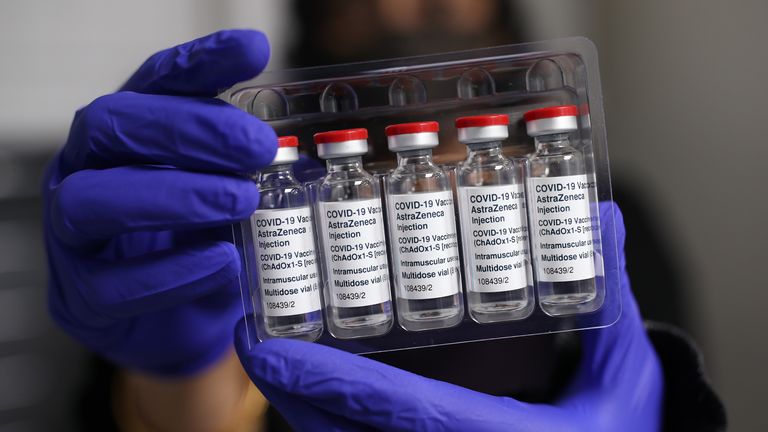Thursday 25 July 2024 10:46 PM
newsonline - The chief executive of AstraZeneca has criticised a public health body for refusing to make one of its breast cancer treatments available to NHS patients in England and Wales.
The National Institute for Health and Care Excellence (NICE) decided in March this year that patients should be denied access to Enhertu because it said the drug did not provide value for money.
Money blog:' Major boost' for borrowers as two banks cut mortgage rates
But Sir Pascal Soriot said he was disappointed at the decision - which is estimated to have affected at least 1,000 patients to date - and not least because Enhertu had been made available to patients in 17 other European countries, including NHS patients in Scotland.
He told Sky News: "NICE has a methodology that leads to difficult access for innovative medicines… called severity scoring. And as an example, the decision was… that metastatic breast cancer is only a moderately severe disease.
"Most people would say it's a severe disease. Patients, I'm sure, would say it's a severe disease. But NICE concluded it's a moderately severe disease. It looks like a technical detail, but it's very important because it drives willingness to pay.
"So the end result is 17 countries around Europe have decided to reimburse Enhertu for metastatic breast cancer. More recently, Romania, reimbursed it. In the UK, Scotland, which is using a different methodology, decided to reimburse Enhertu for metastatic breast cancer.
More from Business
"And in England and Wales, patients don't have access because of this NICE methodology.
"It really has to change. It's affecting on health too, but it will affect many innovative new medicines that are brought to patients who are dealing with severe disease."
Advertisement
Raised at 'every opportunity'
Sir Pascal said he had raised the issue at "every opportunity" with ministers and said he understood the new government was looking at it.
He went on: "We are hopeful that the methodology can be changed… If the methodology was to score metastatic breast cancer as a severe disease automatically, instantaneously, the methodology NICE uses would recommend [using Enhertu].
"It's not a question of price. The question is the methodology and the decision to score metastatic breast cancer as a moderately severe disease or a severe disease - which we all believe it is."
Sir Pascal said the decision was important because it influenced where companies like AstraZeneca invest in research and development and launch new medicines.
Keep up with all the latest news from the UK and around the world by following Sky NewsTap here
He added: "When the industry… makes decisions to invest, we look at [whether] we have good science in the country? And here the answer is a resounding yes for the UK. We have great science in this country. Do we have the right talent pool? The answer is another resounding yes. We have a great talent pool in the UK. Then you look at the financial environment, the tax rate, and finally you look at access.
"Because if you want to invest in research and development, you have to believe your medicines will be brought to patients. Otherwise you… [may] as well do your R&D elsewhere, in other countries, where your medicines… [will benefit patients].
"And that's really the area where most efforts need to be made."

Investing abroad rather than the UK
Sir Pascal - who early last year cited "discouraging" tax rates for a decision to invest $360m in a new manufacturing facility in Ireland rather than the UK - said the last government had addressed some of his concerns by, for example, addressing the rebates drug companies must pay the NHS when its branded drugs bill rose above a certain level.
Those costs soared during the pandemic and left the NHS - which already pays less for its medicines than other European healthcare providers - clawing back vast sums from the industry.
He said Rishi Sunak's government had also incentivised investment by the industry - resulting in AZ's announcement in March that it will invest £450m to research, develop and manufacture vaccines in Speke, Merseyside.
Increased profit
He was speaking as AstraZeneca, the biggest company in the FTSE-100, was reporting a 7% rise in its core operating profit, to $8.4bn, for the first six months of the year and upgraded its sales and profits forecasts for the whole of 2024.
Sales rose by 18%, to $25.6bn, with AZ seeing growth in four out of five of its key therapy areas - oncology; cardiovascular, renal and metabolism; respiratory and immunology and rare diseases.
The only sales slowdown was seen in vaccines and immune therapies and reflected lower demand for the company's COVID-19 vaccine.

Ironically, Enhertu saw the biggest sales growth, with revenues up 62% on the first six months of 2023, but the biggest-selling medicine was again Farxiga, AZ's treatment for type-2 diabetes and chronic kidney disease, where sales rose by 38% to $3.8bn during the period.
The number one player
Sir Pascal, who is widely regarded as the most successful CEO of his generation, cited particularly strong sales in emerging markets - where AZ is now the number one player globally among its peers.
AstraZeneca recently committed to launching 20 new molecular entities (medicines to be submitted for clinical trials) by 2030 and Sir Pascal said these would include treatments for types of cancer, obesity, kidney disease and heart disease.
He said 'combination therapies' - where more that one medicine is used in a treatment regimen - were revolutionising the future of healthcare and especially in how cancer was treated.
He went on: "Science has exploded, really, in our industry in the last few years. And so we're investing in a number of technologies.
"Let me give you an example of how we want to use this. If you look at metastatic cancer it's very hard to cure patients - you extend life rather than cure patients.
"Our vision to cure cancer is actually to attack the cancer tumour with a combination of antibody drug conjugates, or dual nucleotides together with bispecific antibodies…immune therapies. So you attack the cancer tumour, you break it down, you shrink it…and you prevent the cancer cells or the tumour from protecting itself against future treatments.
"Now, it's not going to work in every cancer in every patient. But I think the hope is high that, in a number of settings, for a number of patients, we can achieve a cure over the next five to 10 years."










